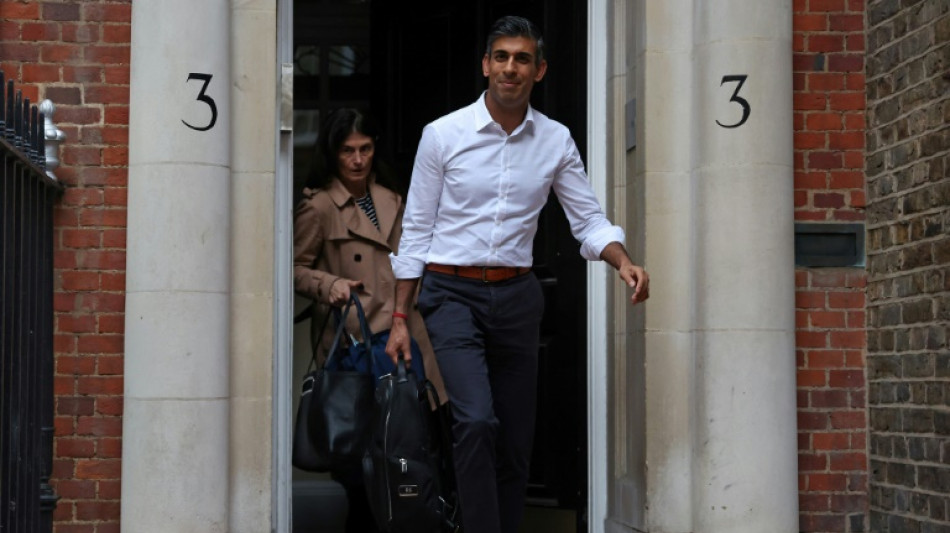

Rishi Sunak to become Britain's new prime minister
Former finance minister Rishi Sunak on Monday won the battle for leader of Britain's Conservative party and will become the country's first prime minister of colour.
Penny Mordaunt, the last rival left after Boris Johnson dramatically pulled out, failed to secure the necessary 100 nominations from her fellow MPs.
"Rishi Sunak is therefore elected as leader of the Conservative party," senior backbencher Graham Brady said, as Mordaunt pledged her "full support" for Sunak.
Sunak's triumph came after Johnson's decision late Sunday to abandon his political comeback bid.
Just weeks after he lost out to Liz Truss to lead the ruling Tories, Sunak therefore pulled off a stunning reversal in fortunes.
The contest, triggered by outgoing leader Truss's resignation on Thursday, had required candidates to secure the support of at least 100 Conservative MPs by 2:00 pm (1300 GMT) on Monday.
Only Sunak made the threshold, Brady announced.
Sunak, a wealthy Hindu descendant of immigrants from India and East Africa, had crossed that threshold by Friday night, and amassed nearly 200 public nominations -- more than half the parliamentary Tory party.
Johnson's withdrawal from the race -- before he had even formally announced his candidacy -- left cabinet member Mordaunt the only other declared contender.
However she failed to garner the necessary support, putting an abrupt end to the contest.
If she had, the race would have been decided by the party's roughly 170,000 members in an online vote, with the result not announced until the end of the week.
Sunak's victory came on the day Hindus worldwide mark the start of the five-day festival of Diwali -- a celebration of the victory of good over evil.
When he was chancellor of the exchequer, in November 2020, Sunak marked the occasion by lighting oil lamps on the front step of the chancellor's official residence at 11 Downing Street.
- 'Dire straits' -
The Tories were forced into their second leadership contest since the summer due to Truss's resignation after only 44 days following a disastrous market response to her tax-slashing mini-budget.
She had replaced Johnson in early September following a government revolt led by Sunak over a slew of scandals, most notably the "Partygate" controversy involving Covid lockdown-breaching parties.
Johnson's attempt to make an immediate return to Downing Street had raised the prospect of months of disarray and disunity within the ruling Conservatives.
Critical backbench Tory MPs warned there could have been a wave of resignations under Johnson's renewed leadership, which might have led to the general election demanded by opposition parties. One is not due for at least two years.
Johnson had cut short a Caribbean holiday to return to Britain on Saturday.
But in a sign of his diminished political standing, Johnson abruptly conceded late Sunday, admitting "you can't govern effectively unless you have a united party in parliament".
"I believe I have much to offer but I am afraid that this is simply not the right time," he said, while insisting he had secured the 100 nominations needed to progress.
Sunak was quick to pay tribute to Johnson, tweeting: "I truly hope he continues to contribute to public life at home and abroad."
- 'Profound crisis' -
Mordaunt had insisted she was best placed to take the fight to the opposition Labour party, which is soaring in the polls.
In an article in the right-wing Daily Telegraph, she also stressed her commitment to a "lower-tax, high productivity economy".
Sunak kept a lower profile, writing simply on his Twitter account that the country faced a "profound economic crisis".
"I want to fix our economy, unite our party and deliver for our country," he said.
Labour is demanding a general election now.
"Tory MPs are set to hand Rishi Sunak the keys to No 10 (Downing Street) without him saying a single word about how he'd govern," tweeted Angela Rayner, deputy Labour leader.
Anand Menon, politics professor at King's College London, said Sunak becoming prime minister was a landmark.
He added that he was reassured by how little comment there had been about it.
"In a sense... we seem to have normalised this," he said.
F.Bauer--MP




